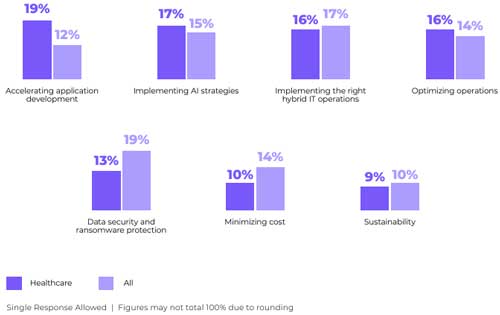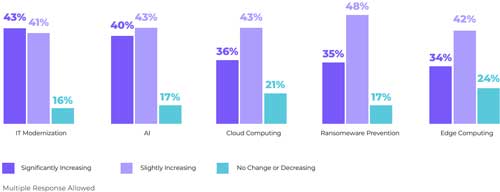News
For Healthcare Execs, Road to AI Remains Rocky: Survey
Is AI more trouble than it's worth? Executives in the healthcare field have decidedly mixed responses.
While AI adoption is a top priority at many organizations, it's also one of the biggest challenges, as shown by the findings of the recent Healthcare Enterprise Cloud Index report by Nutanix, which polled IT decision-makers at healthcare organizations around the world about their progress around cloud adoption, ransomware prevention and, of course, artificial intelligence.
AI, specifically, presents a conundrum for healthcare. Executives acknowledge that AI has the potential to drive their future infrastructure efforts, but that doesn't make AI adoption any less difficult.
"CXOs recognize AI's role in driving IT infrastructure modernization," Nutanix said in a blog post last week. "Integrating AI into business operations became a priority in 2023, underscoring the need to re-evaluate and enhance existing IT investments to support AI apps. But 37 percent of businesses say that the state of their current infrastructure is a challenge."
 [Click on image for larger view.]
Figure 1. CIO/CTO/leadership priorities. (Source: Nutanix)
[Click on image for larger view.]
Figure 1. CIO/CTO/leadership priorities. (Source: Nutanix)
The report explains more about that priority/challenge dichotomy.
"Support for AI tied as the top IT infrastructure purchase criterion among healthcare organizations. In addition, implementing AI strategies came in second when healthcare respondents ranked what they considered the biggest priority for their organizations' CIO/CTOs and leadership (17 percent). ... And 84 percent of healthcare organizations said they were increasing investments in AI strategy in the coming year. The same group, however, largely considered running AI to be a challenge (82 percent), with 33 percent describing it as a 'significant' one."
 [Click on image for larger view.]
Figure 2. Top healthcare IT investment plans for the next 12 months. (Source: Nutanix)
[Click on image for larger view.]
Figure 2. Top healthcare IT investment plans for the next 12 months. (Source: Nutanix)
Other highlights of the report as presented by the company in an April 17 news release include:
-
Healthcare organizations have accelerated their use of multiple IT operating models, and both their current and planned mixed IT deployments now surpass those of the global response pool. Nearly three-fourths (73 percent) of ECI respondents in healthcare organizations reported using multiple IT models this year, compared to 53 percent last year. Last year, healthcare was behind the average across industries by seven percentage points and now outpaces it by 13 points.
-
When healthcare organizations are investing in IT infrastructure, workload portability and AI support are top of mind -- and next year's budgets reflect these priorities. ECI respondents in the healthcare sector identified AI and the flexibility to move workloads back and forth across private and public cloud infrastructure as the most important factor driving purchasing decisions at 17 percent each followed in importance by the performance potential of the infrastructure (14 percent) and how well it lends itself to successful data sovereignty and privacy management (14 percent).
-
Security and compliance fluctuations and concerns are the biggest reasons enterprises relocate their applications to a different infrastructure. An overwhelming majority of healthcare respondents (98 percent) and across industries (95 percent) responded that they moved one or more applications in the past 12 months driving the need in their organizations for simple and flexible inter-cloud workload and application portability. This is largely being fueled largely by shifting security-related requirements, according to respondents.
-
The top-ranked challenges in healthcare IT departments are related to multi-environment operations, security, and sustainability. When asked to name their number one data management challenge today, an equal percentage of healthcare ECI respondents identified complying with data storage/usage guidelines and linking data across disparate environments (20 percent) as the top factor. Other data security issues, including combating ransomware and ensuring data privacy, were each cited by the next greatest number of respondents (17 percent).
As far as the future outlook, the company said, "Embracing the inevitability of hybrid multicloud as the new norm demands a reimagined approach from CXOs. This reimagined infrastructure challenges leaders to dismantle silos, fortify against cyberthreats, and ensure seamless performance across diverse platforms, all while tailoring solutions to the demands of their business."
The report is based on a December 2023 survey of 1,500 IT and DevOps/platform engineering decision-makers around the world conducted by U.K. researcher Vanson Bourne. The respondent base spanned multiple industries, business sizes, and geographies, including North and South America, Europe, the Middle East and Africa (EMEA), and the Asia-Pacific-Japan (APJ) region.
About the Author
David Ramel is an editor and writer at Converge 360.